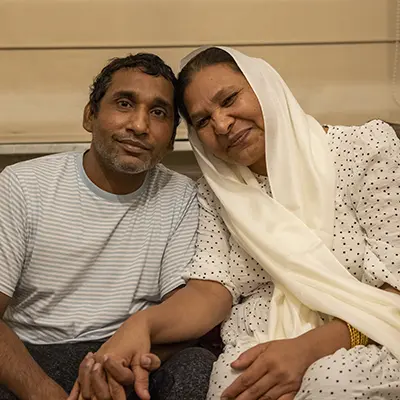- Police amend “unnecessary” and “disproportionate” bail conditions which had been imposed on Isabel Vaughan-Spruce following successful challenge backed by ADF UK
- Charity worker faced expulsion from public spaces beyond the censorial “buffer zone” around Birmingham abortion facility, following her recent arrest over silent prayer
Birmingham (14th April 2023) – West Midlands Police have relaxed the onerous bail conditions placed on Isabel Vaughan-Spruce, the charity worker who has been arrested for the second time for praying silently outside an abortion facility in Birmingham.
Vaughan-Spruce, who has been a volunteer for crisis pregnancy help services for twenty years, was arrested on 6th March for praying in a so-called “buffer zone” around an abortion facility on Station Road in Birmingham. The zone is imposed by a local Public Spaces Protection Order (PSPO), available here.
Following her arrest, police imposed bail conditions that prohibited her presence in an area considerably larger than the buffer zone, including outside a local church where she leads a group of volunteers in prayer and charitable support throughout Lent.
Process becoming Punishment
Police claimed that these extensive conditions were necessary to prevent Isabel from “committing an offence whilst on bail” or from “interfering with witnesses or otherwise obstructing the course of justice”. However, backed by ADF UK, Vaughan-Spruce’s legal team submitted that these conditions were “unlawful and effected in this case for an improper purpose.”
Given that no witnesses are known to be involved in this case, Vaughan-Spruce’s legal team submitted that the “interference with witnesses” grounds for the bail conditions were “disingenuous” and “imposed for an ulterior motive”. The team successfully argued that banning Vaughan-Spruce beyond the buffer zone amounted to a “disproportionate and unnecessary” restriction on her freedom in relation to the allegations of a “relatively simple” crime.
“I’m glad to see some measure of justice restored to proceedings that had imposed excessive burdens on my everyday life. Nobody should be criminalised for the thoughts that they hold in their head. After my first arrest, a court found that my actions did not result in a crime and that I was completely innocent. Yet, I find myself arrested yet again, for the same activity – simply praying, silently,” commented Isabel Vaughan-Spruce, upon news of the success of her challenge to her bail conditions.
“By imposing such arduous and far-reaching restrictions as my bail conditions, police officers ensured that the process became my punishment, even before I have been tried following this second arrest. The bail conditions had a serious negative impact on my life. The prayer group which I lead had decided to meet to pray outside of the ‘buffer zone’ to avoid any confusion during Lent. Yet even though they took this precaution, I was forbidden from joining them for our month of prayer meetings because of the restrictions of my bail conditions,” she continued.
“The police are behaving as judge, jury and executioner”
Vaughan-Spruce’s bail conditions had been imposed during the Lent season, which is one of two periods during the year that a group of Christian volunteers gather to pray in a community outreach campaign known as “40 Days for Life”.
West Midlands police applied the bail conditions for three months, which is the maximum initial period available under the Police, Crime, Courts and Sentencing (PCSC) Act 2022.
Under the terms of the Act, a suspect may be bound by imposed conditions despite not yet being formally charged following an arrest.
“Whilst we welcome West Midlands Police’s decision to relax Isabel’s excessive bail conditions, the cavalier manner in which her basic rights were restricted is deeply concerning. In Britain, you are innocent until proven guilty, which means the citizens are entitled to demand that any curtailment of their civil liberties are proven to be strictly necessary and proportionate – criteria that West Midlands Police failed to meet in the initial bail conditions imposed on Isabel,” explained Jeremiah Igunnubole, legal counsel for ADF UK, who are supporting Isabel’s legal defense.
In 2022, ADF UK and other civil liberty groups warned that broadly drafted laws under the Police, Crime, Sentencing and Courts (PCSC) Act 2022, will inevitably be used by police officers to erode the most basic of freedoms.
This concern is compounded by Free Speech Union’s recent report, which found that approximately 78% of the police forces are providing no or inadequate training on freedom of speech.
“By punishing Isabel without reference to the prosecution or courts, police are now in the ominous position of judge, jury and executioner. Newly introduced public order legislation has handed broad and unaccountable powers to police officers without at the same time training them to confidently differentiate between criminal acts and the peaceful exercise of fundamental rights such as free speech, thought, and religion. The upshot has and will be repeated civil liberty violations of the kind Isabel has endured. This in turn entrenches a culture of authoritarianism and will ultimately serve only to damage the public’s confidence in policing,” continued Igunnubole.
“There is now an urgent need for police officers to receive training on freedom of speech, thought, religion and associated civil liberties. In a free and democratic country, no law should ban peaceful prayer, charitable support and the free and frank exchange of ideas. No officer should be confused about the difference between the peaceful exercise of fundamental rights such as silent prayer and criminal behaviour such as harassment and intimidation. Isabel’s ordeal shows that unlimited power in the hands of an untrained police force will always lead to injustice,” he concluded.














